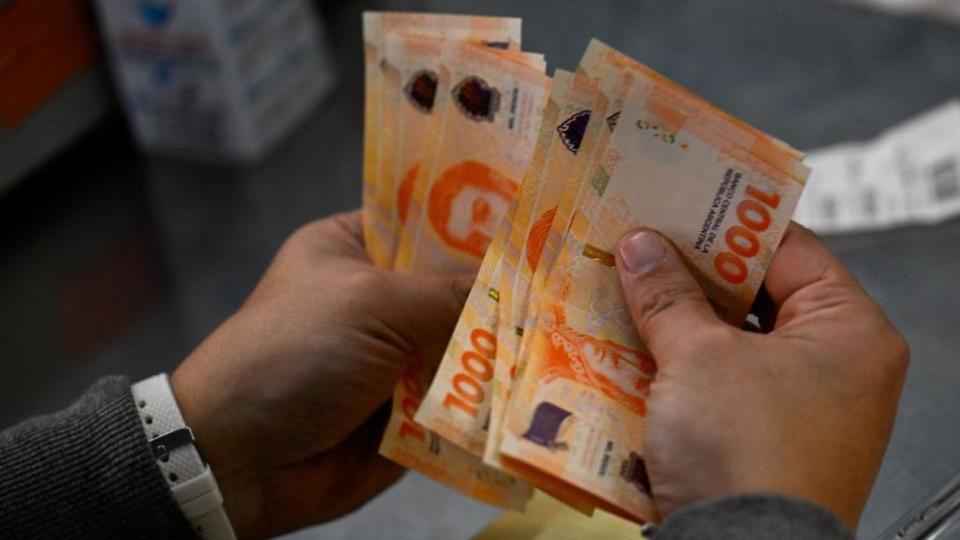When Javier Milei was campaigning in 2015 to end up being the president of Argentina, he displayed a chainsaw to symbolise his decision to significantly cut public costs.
Now 6 months into his conservative presidency, how is his shock treatment for both the nation’s federal government and economy working?
“The modifications our nation requirements are extreme,” Mr Milei stated quickly after being chosen. “There is no space for gradualism.”
And he definitely took quick action. In his preliminary bundle of steps, he cheapened Argentina’s currency, the peso, by 50%, slashed state aids for fuel, and cut the variety of federal government ministries by half.
The fast decrease in public costs has actually assisted Argentina swing from a financial deficit – the distinction in between the federal government’s costs and earnings – of 2tn pesos ($120bn; £93bn) in December of in 2015 to a surplus of 264.9bn pesos in April.
Argentina likewise reported a surplus in January, February and March, marking the very first time it had actually accomplished this month-to-month target because 2012.
Nevertheless, Mr Milei, who explains himself as a libertarian, has actually made cutting inflation his primary concern, informing the BBC in 2015 that it was “the many regressive tax that most affects individuals”.
Inflation has actually slowed – in April the month-on-month rate was up to 8.8%, the very first time because October that it was not in double figures. This inflation procedure is carefully followed in nations like Argentina that have actually long had high inflation.
Yet when it pertains to the more globally-recognised yearly inflation rate, this hit 289.4% in April. To put that into point of view, in the UK the yearly rate is presently simply 2.3%.
And although main development figures are not yet offered for the duration because Mr Milei took workplace on 10 December, there is proof that Argentina’s economy has actually contracted dramatically, with customer costs dropping off in the very first 3 months of this year.


On the other hand, other promises that Mr Milei made while marketing, such as changing the peso with the United States dollar and eliminating the reserve bank, have actually taken a rear seats just recently.
The issue for President Milei is that his La Libertad Avanza union (in English – Liberty Advances) does not command a bulk in the Argentine Congress. And it has actually discovered it difficult to strike cross-party offers.
Mr Milei desires Congress to give him the power to privatise more than 2 lots state-owned business, consisting of the state airline company, the trains, the postal service, and the nationwide water provider.
His preliminary “omnibus” costs, including the privatisation strategies and numerous other financial steps, stopped working to pass a 2nd reading in February. A structured variation, resubmitted to Congress in April, cleared the lower home however has yet to be authorized by the Senate.
The president likewise deals with strong opposition from trade unions, who have actually required to the streets in demonstration, stating that employees’ rights will struggle with the wholesale deregulation of the economy.
Juan Cruz Díaz, handling director of Argentina-based geopolitical danger consultancy Cefeidas Group, states Mr Milei’s financial policies in workplace are as extreme as those guaranteed throughout the project, simply rather postponed.
“His administration has actually been required to decrease these reforms, provided the political and social obstructions it has actually dealt with,” states Mr Díaz.
He includes that particular aspects triggering the president to tread very carefully are “the wear and tear of individuals’s acquiring power and the worry of increased social discontent”.
This comes as there has actually been no let-up in the variety of individuals residing in hardship, which has actually increased from about a quarter of the population in 2017 to majority now.
Nevertheless, the International Monetary Fund, which over the years has actually provided more cash to Argentina than to any other nation, offered the federal government high marks in May, stating that its efficiency was “much better than anticipated” which its financial program was “strongly back on track”.
Regarding whether President Milei can get more policies concurred by parliament, Mr Díaz states that while some sectors of the opposition are open to discussion with the federal government, left-leaning celebrations are entirely opposed to his program. These consist of the Peronist faction managed by ex-President Cristina Fernández de Kirchner.
“In this context, the federal government’s capability to work out and develop agreement is being checked every day, a test that Milei himself typically prevents with particular outbursts and unneeded confrontational declarations,” states Mr Díaz.
In reality, numerous Argentines are seeing Mr Milei’s ebullient character as more of a barrier than an aid.
In its newest study, the Zuban Córdoba political consultancy company discovered that 54% of participants believed the president was paying more attention to his global political image than to fixing Argentina’s issues.
That understanding believes been boosted by Argentina’s existing diplomatic row with Spain, which has actually led Madrid to remember its ambassador to Buenos Aires.


Kimberley Sperrfechter, emerging markets economic expert at research study group Capital Economics, states the main issue for President Milei is that he needs to get rid of “years and years of financial mismanagement” in Argentina.
“One crucial element is that the federal government has actually been investing method beyond its ways [for decades],” she states. “Which deficit has actually been funded by the reserve bank printing cash to fund the federal government costs.”
This printing assisted trigger the nation’s skyrocketing inflation.
Argentina, the world’s eighth-largest nation, has actually in reality remained in decrease for more than a century. Its failure working as a cautionary tale of how the wealth of a country can be frittered away.
Before World War One, it ranked as one of the world’s 10 wealthiest nations.
However a subsequent sluggish financial contraction was significantly sped up by the populist policies – and spending too much – of President Juan Perón, who was in power from 1946 to 1955.
There were some temporary free-market reforms in the 1990s under President Carlos Menem, who privatised much of the companies that Perón had actually nationalised, and made severe efforts to bring back faith in the Argentine currency.
However things took a dogleg for the even worse at the end of 2001, when the nation suffered a disastrous financial crisis and an enormous $102bn (£80bn) financial obligation default.
Argentina had actually basically locked itself into a currency routine that offered it no versatility, by repairing the peso at parity with the dollar. That, paired with the federal government’s regular overspending, had actually exposed it to the ups and downs of the United States economy, and left it helpless when a work on Argentina’s banks took place in 2001.
In the 2 years following that crisis, the nation has actually primarily been governed by left-wing protectionists, who essentially muddled through without taking on Argentina’s deep-rooted issues.
Now, with a conservative libertarian administration in power, the nation is trying to chart a brand-new course – which indicates getting the federal government’s financial resources on a sound footing.
To assist President Milei’s federal government accomplish this, research study company Agreement Economics states the administration is concentrating on Argentina’s huge farming exports of grain, soya, meat and red wine.
“Policymakers are pinning their hopes on farming exports generating terribly required foreign currency as they wish to develop the reserve bank’s diminished [foreign exchange] reserves and, in turn, increase the state’s monetary reliability,” states Agreement.


Yet Ms Sperrfechter believes the Argentine economy is at a “tipping point” at the minute, and Mr Milei cannot count on public assistance, in spite of his election triumph.
“It’s not that individuals were encouraged by his policies, it was more of a demonstration vote,” she states. “Things might not continue the method they had actually been.”
Ms Sperrfechter feels that in spite of the decline of the peso, the currency continues to be misestimated, perhaps by as much as 30%. The currency exchange rate is still being handled, rather of being completely complimentary to increase or fall, she states, and this is keeping back development and damaging competitiveness.
“With Argentina, you never ever actually understand, however I believe the shine is coming off,” Ms Sperrfechter states. “The optimism is going to fade, and the economy is going to battle.”
